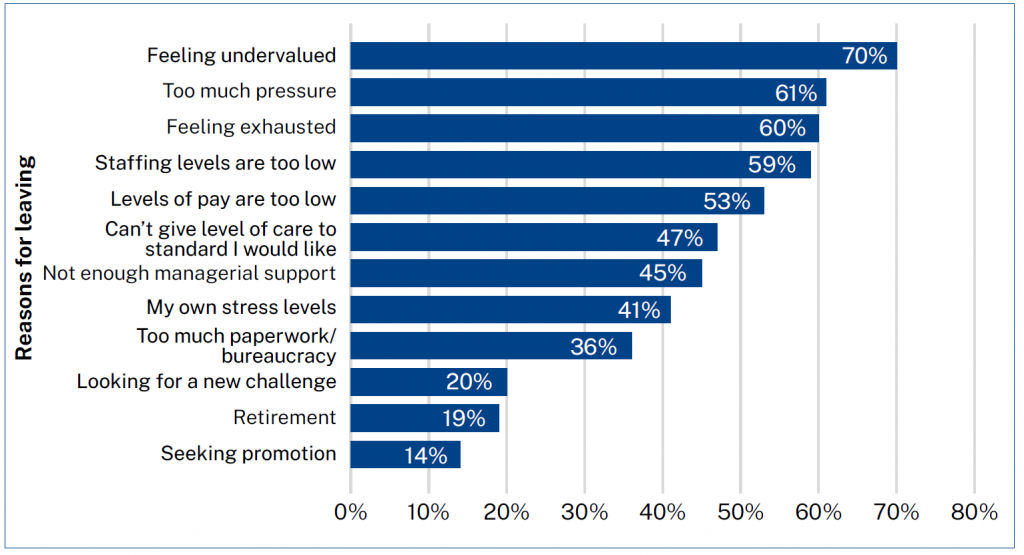Nurses are turning away from the NHS not only for low pay, but a feeling that they aren’t getting the respect, especially from the Welsh Government.

The government needs to take swift action to prevent a mass exodus of nursing staff, according to a leading health campaigner.
One of the key concerns is a lack of respect, says Marc Evans, an NHS nurse from Wales who has been striking for FairPayForNursing for a long time.
“I have been qualified for 12 years and seen the NHS become more ignored—there is a lack of staff and a lack of resources to support proper work. Why would others choose to enter the profession when the current workforce is being forced into the corner?” said Marc.

To examine the cause of the young nurse’s exodus, Royal College of Nursing (RCN) has conducted a survey, it is surprising to see that pay is only the fifth reason for leaving, thousands of skilled nursing staff are leaving mainly due to poor mental health and negative workplace culture.

“It has been difficult to provide the care and support that patients deserve since COVID-19, when community care services had gradually dried up due to low capacity and declining caring resources, which resulted in patients waiting in hospital for much longer,” said Marc.
Through the pandemic, many nurses were stepping up time and time again, working long hours, living away from their families so that they didn’t give covid.
“Now the Welsh government said our waiting lists have gone up because of covid, so more nurses are needed to step up again and work extra hours to cover the waiting lists, which they’ve duly done, but with no extra stuff and no extra resources,” said Nicky Hughes, the RCN Wales Associate Director.

“As a soon-to-be qualified nurse, I no longer want this career. The reality feels I must sacrifice my own health and wellbeing for a less than satisfactory wage to do half the job I would like to,” a student on placement in intensive care from England. “I see nurses crying, extremely stressed but wanting to do good and yet are not given the opportunity to.”
The booming caring needs and the stress of being understaffed, are passed on to the frontline nurses, and the constant struggle between caring for patients and themself became the last straw discouraging them.
“We’ve not let nurses have any respite from covid, to have some time to reflect, to process what they’ve been through and get back into a good place physically and mentally,” said Nicky. “They’re now being asked to step up again and again. That’s why we’ve seen lots of nurses leaving now.”
The departure of experienced nurses leaves a gap in support for newly qualified nurses, and now they didn’t gain necessary practical guide and experiences to care for that patient properly.
“New nurses used to have preceptorship, with very skilled nurses working by the side of them, ” said Nicky. “When lots of experienced nurses retire or leave the profession, they just couldn’t cope with the fact that they were going home after a shift, worrying all night: Did I give patients the right care? That adds a mental strain to young nurses.”

What’s worse, being undervalued is also turning the next generation of nurses away.
Susan Ward, the head of nursing school in Cardiff University, responsible for young nurse recruitment and training, found the enrolment of nursing schools is different from that before the pandemic as well.
She explained that applicants have fallen by 22% in Wales compared to last year when it was the application peak across the UK, thanks to all the clapping for heroes and spotlight being on health care during the pandemic.
“We face a bit of a challenge now. We have more places for nurses and yet get less applicants,” said Susan. “We are commissioned by the Welsh government. They set the number of students they would like us to train, but there are still probably 2000 vacancies in the NHS for Wales now.”

Although the mass exodus of experienced nurses is tricky when there exists such a big gap already, there are still nurses staying.
“I became a nurse because I wanted to help people in need. Unfortunately, given the stress and high workloads, I did think about leaving the profession once,” said Marc. “The lack of resources, the lack of staff, being forced to take strike action to protect our profession, the NHS and our patients make me feel worse. The NHS cannot continue the way it has been going.”

Any loss is a waste of talent. Becoming a qualified nurse has a strict standard, which stipulates a 3-year degree, 2300 hours of theocratic study, 2300 hours of practice to enter the register.
“Actually, students nurse still want to do nursing jobs. But imagine, you’re going to work every day and you know that it’s very short staffed every day, the emotional responsibility that you have is enormous. The only thing you can do to make the situation better for yourself, is to remove yourself from that situation,” Susan explained.
